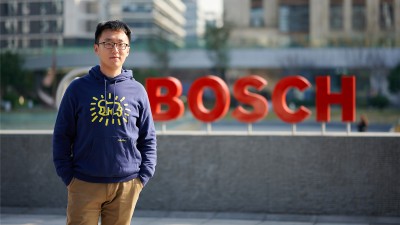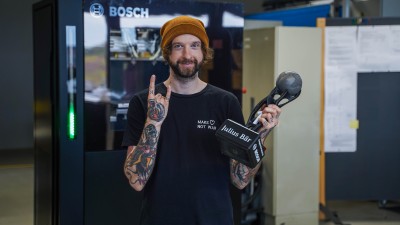From a vision on paper to real-world impact

From the whimsical sketches of childhood and the bold research at university to collaborative projects in professional life, inspired visions are always at the heart of the world’s creators. Today, taking a strong business model on paper and making it into a reality is a big undertaking. When a vision is realized, it’s not only gratifying on a personal level, but also transformative for businesses and valuable for societies.
For Hao Sun, going from paper to the real-world impact required the transition to Bosch Business Innovations.
From Bosch Corporate Research to Bosch Business Innovations and back again
Today, Hao Sun is a Senior Research Scientist at Bosch Corporate Research, as well as Team Lead of the 3D computer vision team. Currently responsible for deep-learning-based perception for real-world applications, he supports different Bosch business units, including the Drive and Control Technology and Cross-Domain Computing Solutions departments. Fittingly, Hao frequently works with Bosch Business Innovations (formerly grow platform) – the place where his start-up Bosch Spatial Data sprung to life.
After graduating from the National University of Singapore, Hao started working at Bosch Corporate Research Bosch as a Senior Research Scientist. After that, he moved to Bosch Business Innovations as intrapreneur at Bosch Spatial Data (formerly Bosch InSite), a start-up within the platform, before taking on his current position.

Visions can come from anywhere

Bosch Spatial Data is an innovative hardware and software start-up that creates solutions for measuring, comparing and tracking project data on construction sites.
It started as a research project within the Corporate Real Estate (CRE) & Facilities Team at Bosch, the department in charge of Bosch building. After hitting some roadblocks early on, they turned to Hao – then a senior research scientist at Bosch Research – for further development.
“The Corporate Real Estate colleagues came to me with real-world painpoints. There was a deviation in the design delivery, and they had a rough idea to make a digital twin of the building to cover this deviation. But they didn’t know how to achieve the technical details.” So in stepped Hao to take charge of the technology framework design and architecture.
When he started out on the project, Hao relied on his background in deep learning and semantic perception for autonomous driving. This technical experience allowed him to explore pioneering sensors such as LiDAR and Inertial Measurement Units (IMU), while his passion for the algorithm part helped pushed progress even further.
With keen understanding of customer painpoints and competitor research, his research and vision began to take shape. But according to Hao, these were not enough. In order to add high-impact value to the lives of customers, he needed real solutions using Bosch technology. That’s when the project transformed from simple research into a burgeoning start-up, backed by Bosch Business Innovations.
Coming together as a team
The connection between Bosch Business Innovations, each start-up and Bosch Group is as unique as it is strong. There is no other way. When starting Bosch Spatial Data, it was only Hao and two colleagues, along with frequent support of the product owner from the department.
While Hao worked on the AI model development and algorithm development, everyone came together to create a bridge from the customer painpoints to the industry as a whole. With additional support for the Graphical User Interface design (GUI), their solution was getting to becoming a reality. No matter the size of the team, everyone was in position to contribute and succeed.

From pure researcher and technology expert all the way to intrapreneur, Hao embraced different roles during his time at the start-up. This willingness and ability to take on different roles is critical for any intrapreneur, as life in a start-up requires agility and openness.
The one-of-a-kind impact of Bosch Business Innovations

Successfully playing multiples roles comes from understanding the purpose behind the project. Hao remarks that the aim of any project is to really make the technology and research ready for the real-world applications. He says, “Some research is only on paper – and it cannot help the real world and help generate profit.” In his view, to help the business unit generate the profit, you need to start at the real-world problem, then make a deep dive into customer requirements and the necessary technology.
This process is perhaps the most critical element of succeeding as a start-up. While university and academic research can lay a good foundation, it is the actual work that gives the research an opportunity to flourish.
Although Hao is now back at Bosch Corporate Research, his experiences with Bosch Business Innovations have revealed first-hand how good business models can become groundbreaking real-world solutions. Intrapreneurs have access to the people, knowledge and processes to get things done. He says, “The most important thing for us was that we could find the landing point for the technology.” More than a landing point, however, Bosch Business Innovations is a launchpad to blast business model visions into orbit and into the hands of customers worldwide.
Life in corporate start-up
Founding a start-up comes with many challenges, but the excitement and motivation make it all worth it. And with the support of Bosch Business Innovations, many of the initial challenges faced by start-ups can be quickly mitigated or solved. Outside start-ups often lack the immediate resources and team to advance at a successful pace. “In Bosch you have very strong business units with very big platforms where you can always find some backup not only in the technology dimension, but also in some others such as resources and systems.”
For Hao, this far-reaching assistance was – and still is – one of the biggest benefits of the start-up incubator. And it’s one of the biggest reasons why he advocates this path to other aspiring intrapreneurs. Even when looking at other Bosch units, Hao notes the culture, style, speed and technology that set the unique platform apart. “I think Bosch Business Innovations is more agile. And you have more freedom to do what you like.”

Positive memories meet exciting opportunities
Hao smiles when thinking back to his time at Bosch Spatial Data, where he had the chance to work at start-up speed combined with the vast support of a global network. With such a positive experience, Hao recommends the intrapreneur life to other Bosch colleagues. “If you have a business vision identified, Bosch Business Innovations can make it happen and make it become profitable. I also had the chance to collaborate with different people including sales, customers, IT vendors, and other Corporate Research supporting teams. This brought me the opportunities to interact with different people and learn new ways of thinking.”
What goes around comes around. As current Senior Research Scientist at Bosch CR, Hao jumps at the chance to work with everyone at the Home of Bosch Intrapreneurs – to help them turn good business models on paper into valuable, market-driven solutions.


Hao Sun
Hao Sun has been working at Bosch since 2019. He graduated from Nanyang Technological University with a Bachelor of Engineering in Mechatronics and earned his Doctoral degree in Autonomous Driving Perception from National University of Singapore. After a successful stint at Bosch Corporate Research as a Senior Research Scientist, he moved to Bosch Business Innovations as intrapreneur at Bosch Spatial Data (formerly Bosch InSite). Today, Hao is a Senior Research Scientist at Bosch Corporate Research, as well as Team Lead of the 3D computer vision team, where he solves problems using deep-learning-based perception for real-world applications.


